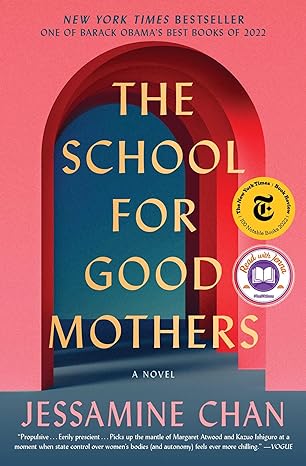[ad_1]
Jessamine Chan’s 2022 novel The College for Good Moms (New York: Simon & Schuster) constructs a bureaucratic dystopia wherein unfit dad and mom—largely moms, however not all—are ordered by household courts right into a re-education camp run by Little one Protecting Providers.

Maybe essentially the most chilling a part of the narrative is how simple it’s to think about a path in the direction of such a future. After the profitable tv adaptation of The Handmaid’s Story debuted in 2017, Margaret Atwood mirrored, “There’s a precedent in actual life for the whole lot within the ebook,” she says. “I made a decision to not put something in that someone someplace hadn’t already finished.”
The identical will be mentioned of Chan’s College. Forcefully held opinions about the suitable and improper strategy to mum or dad abound in each Chan’s world and ours. So do the applied sciences succesful to monitoring any and all interactions between mum or dad and little one. Even scanners and AI applied sciences able to perceiving and monitoring second to second moods and micro-reactions don’t appear a lot the area of speculative science fiction as merchandise that would present up in a Google industrial any day.
And, in fact, we do have already got a authorized equipment for eradicating kids from unfit dad and mom—and for good purpose. Little one abuse is all too widespread and will be extremely tough to detect. Nevertheless, Household Courts and Little one Protecting Service employees, even when properly intentioned, don’t all the time have the power to know whether or not they’re doing hurt or good by eradicating a toddler from their mum or dad’s supervision. That is most obvious within the unhappy circumstances of youngsters who’re unnecessarily eliminated or subjected to abuse and neglect after being positioned within the foster care system. This example is sadly understudied, with little one welfare businesses typically anticipated to make use of scarce sources to police themselves.
The principle protagonist in Chan’s novel is an overworked, sleep-deprived, recently-divorced girl who loses her 18-month-old daughter as a result of she left her house alone in an ExerSaucer for two.5 hours so she might get a espresso and retrieve some information from her workplace. Perfect? Definitely not. Maybe not even notably sympathetic. However it’s removed from apparent that this one-time scenario is so harmful that it justifies the trauma of pressured elimination. It’s a scenario paying homage to the Salon piece written by the girl who left her kids in a automobile with the home windows cracked on a cool day for five minutes and wound up going through felony expenses it took years to battle. That exact incident occurred to a lady with the abilities to professionally write about it and the sources to battle the fees. A report from Human Rights Watch and the ACLU discovered that kids are being faraway from properties because of circumstances related to poverty reasonably than abuse or neglect, such because the household whose eight-year-old son was eliminated as a result of they had been utilizing bottled reasonably than working water whereas briefly dwelling in a camper till they discovered a rental. Partially as a result of greater charges of financial hardship amongst Black and Indigenous households, they’re extra prone to be investigated and to have kids positioned in foster care.
And though I hope I’m proper in seeing pressured re-education as one thing the general public wouldn’t at the moment assist, it’s actually not with out precedent in america. Probably the most excessive instance is the lots of of hundreds of Indigenous kids who had been kidnapped and compelled into “Indian Boarding Colleges” between the 1860s and Nineteen Sixties underneath the presumption that the state knew what was finest for them. America does already present sources for in-home coaching for folks whose kids would possibly in any other case be taken away. I’ve no particular argument to make with respect to those applications—I don’t know sufficient of the particulars and it’s an empirical query whether or not or not their present incarnations are useful anyway. However the existence of such a follow does counsel that it’s no nice stretch to think about present policymakers responding favorably to the thought of placing a parenting “professional” in control of figuring out whether or not or not one other mum or dad is doing their job properly sufficient. When considering the flip to consultants it’s all the time price revisiting Thomas Leonard’s Intolerant Reformers, an incisive historical past of Progressive Period social reform efforts that compiles instance after instance of discriminatory and oppressive insurance policies carried out within the identify of consultants utilizing their supposedly superior data to ‘appropriate’ different’s decisions.
Chan’s novel illustrates poignantly the potential harms of turning down such a highway. With out spoiling the plot, dad and mom threatened with the lack of their kids are sometimes keen to go to nice lengths to forestall that from taking place, and as such are susceptible to abuse and manipulation. The train of attempting to suit human relationships into the present scientific understanding of what conduct is ‘finest’ leads to irritating absurdities. In the end, placing discretion over one of the simplest ways to be human within the fingers of bureaucratic authorities deprives relationships of their authenticity. Within the quest to excellent humanity, we develop into much less humane.
Jayme Lemke is a Senior Analysis Fellow and Affiliate Director of Educational and Scholar Packages on the Mercatus Middle at George Mason College and a Senior Fellow within the F.A. Hayek Program for Superior Examine in Philosophy, Politics, and Economics.
[ad_2]
Source link


Add comment